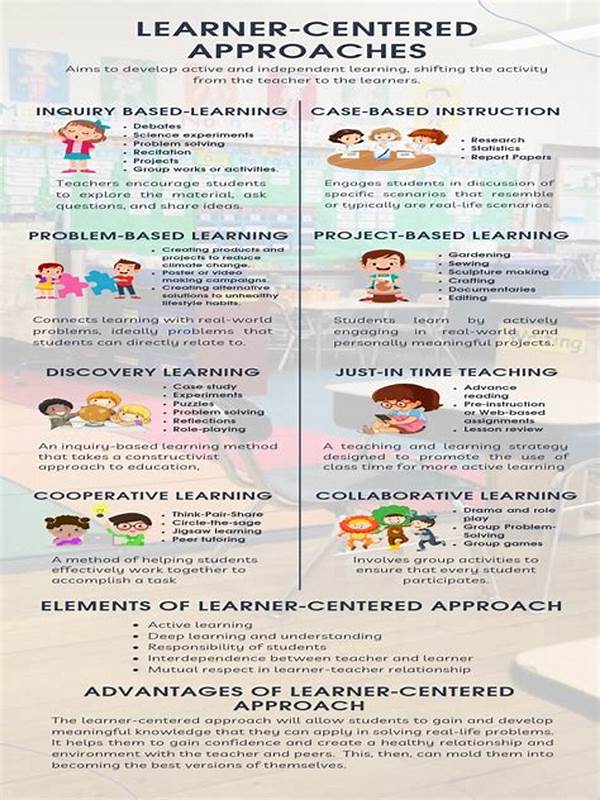In the ever-evolving realm of education, traditional evaluation methods are being reassessed and redefined. Today, the focus is increasingly shifting towards learner-centered evaluation approaches. This paradigm shift places students at the heart of the assessment process, ensuring that evaluations are tailored to enhance their learning experience and personal growth. But what does this innovative approach entail, and how can educators implement it effectively?
The Essence of Learner-Centered Evaluation Approaches
At the core of learner-centered evaluation approaches is the notion that students are active participants in their learning journey. These approaches emphasize personalized feedback, self-reflection, and self-assessment. In a classroom setting, this can mean students are asked to evaluate their performance and become more conscious of their learning strategies. This approach nurtures critical thinking, allowing students to identify their strengths and areas for improvement. Teachers, in turn, adapt their methods to meet each learner’s unique needs, fostering an environment where education feels more collaborative and engaging. Such evaluations promote a deeper understanding of the subject matter, as students are not merely learning to pass tests but are genuinely engaging with the content for lasting knowledge.
Practical Applications of Learner-Centered Evaluation Approaches
1. Personalized Feedback: Giving constructive, personalized feedback encourages students to actively engage with their learning process and understand their progress.
2. Self-Reflection Exercises: Encouraging students to reflect on their learning experiences helps in building self-awareness, a cornerstone of learner-centered evaluation approaches.
3. Peer Assessments: Allowing students to assess each other fosters a collaborative learning environment and sharpens their evaluative skills.
4. Portfolios: Compiling a body of work in a portfolio showcases student development over time and supports the principles of learner-centered evaluation approaches.
5. Student-Led Conferences: Holding conferences led by students allows them to take ownership of their learning paths and goals.
Benefits of Learner-Centered Evaluation Approaches
One significant benefit of learner-centered evaluation approaches is that they empower students to take charge of their learning. When students are actively involved in the evaluation process, they become more invested in their education, which can lead to better academic outcomes and heightened enthusiasm for learning. Additionally, these approaches foster resilience and adaptability, skills that are invaluable in real-world settings. By engaging in self-assessment and reflection, students learn to think critically and creatively. They become equipped to tackle challenges effectively, both inside and outside the classroom. This personal growth is often reflected in increased confidence, motivation, and a lifelong love of learning.
Challenges in Implementing Learner-Centered Evaluation Approaches
While learner-centered evaluation approaches offer many advantages, implementing them can present challenges. For one, traditional educational settings might resist changing long-established assessment methods. Additionally, educators may require training to effectively carry out these innovative evaluation strategies. Time constraints in curriculum coverage can also be a hindrance, as personalized evaluations may require more time than conventional assessments. Furthermore, catering to diverse learning styles within the classroom can become complex. Educators need to continuously adapt their approaches to meet the unique needs of each student, which can be a daunting task without adequate resources and support.
Strategies to Overcome Challenges
To effectively implement learner-centered evaluation approaches, educators can employ several strategies. Collaboration is key; educators can work together to share best practices and resources. Professional development opportunities should be leveraged to equip teachers with the necessary skills and knowledge. Furthermore, technology can be a valuable ally in overcoming time and resource barriers. Educational platforms and tools can simplify and streamline the personalization process, making it more feasible to implement learner-centered evaluation approaches on a broader scale. Building a supportive community where teachers, students, and parents are aligned can also create an environment conducive to the successful adoption of these approaches.
Future Trends in Learner-Centered Evaluation Approaches
Looking ahead, the future of learner-centered evaluation approaches seems promising. As technology continues to advance, more sophisticated tools will become available to help educators tailor assessments to individual needs. Artificial intelligence, for instance, could provide detailed analytics and insights into student performance, paving the way for hyper-personalized learning experiences. Moreover, as global educational trends move towards inclusive, holistic education, learner-centered approaches will likely become more popular. The emphasis on skills such as collaboration, critical thinking, and creativity will align well with these evaluation methods, driving further innovation in education.
Summary of Learner-Centered Evaluation Approaches
Learner-centered evaluation approaches represent a transformative shift in how education is delivered and assessed. By focusing on the learner’s needs, these approaches foster a more engaging, personalized, and impactful learning experience. However, to successfully implement them, educators must navigate certain challenges, leveraging collaboration, training, and technology. As the educational landscape continues to evolve, learner-centered approaches are set to play a pivotal role in shaping future learning environments. They offer a pathway not just to academic success but to nurturing well-rounded individuals capable of thriving in an ever-changing world.
